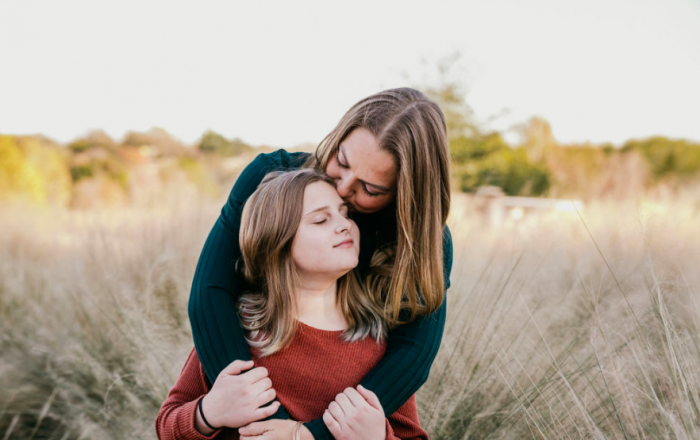5 Ways to Empower Young Voices From a Psychologist | It is a typical, rushed weekday in the car and my daughter starts telling me something. She has a flair for the dramatic, and for story-telling. I’m driving, calculating time in my head (are we late?), checking my ever re-routing Waze app and correcting my son in the front seat (likely something like “Get off your phone.”). She knows when I listen and when I pacify her. Sometimes I can pull it off and sometimes I drop the ball. Sometimes I’m present, and other times she can tell that I am far, far away.
You know how when someone asks you a question and you don’t really hear it until after you respond? That day she asked me if I cared more about what her brother had to say than her, and my auto-pilot/I’m-not-really-listening-but-trying-to-act-like-I-am response was…. “Yes, sweetie, of course.”
No! I cringed, shuttering at the realization of what I had said. My eyes shot up to the rear view mirror and I watched my nine year old wilt into the back seat and her face contort into a tortured frown. I had silenced her, when she clearly already felt unheard. Her heartache was evident. At that moment I knew that the world (and myself included) had done that to her before and would likely do it again. And I decided I have to give her the tools to fight that. Fight that when it comes from me, fight that when it comes from others, and give her the confidence to feel powerful in her voice. But, how? How can we teach our kids how to feel heard? How do we limit the times we drop the ball, and silence their feelings, thoughts and words?
I had the pleasure and good fortune to pick the brain of Dr. Jennifer Ayres on this very topic. Dr. Ayres is the Director of Psychology at Rawson Saunders School in Austin, Texas and private practice clinical psychologist. I’ve compiled the mountain of stellar advice she shared with me and broke it down into five specific areas of focus on the journey of teaching our kids how to be heard.
- Listen. Have designated time you are available, focused and present in interactions with your children. Active listening means time without interruptions, no offering of immediate advice, no judgement and no relating. Our children’s opinions and musings must be taken into consideration as well as their wants and needs. By doing so – we teach them the value of their thoughts and, subsequently, their voice. Sometimes, just hear it. Action: Do your kids tend to want to talk to you at bed time, when you’re already maxed out and ready to clock out? Move up your bed-time routine by half an hour if you can. Give yourself and your children the gift of presence and connection before sleep.
- Label. Label emotions and feelings. Praise, and encourage. When you hear your child self-advocating, make sure to let them know explicitly what about their communication was effective.
- Share benefits you have reaped from self-advocacy.
- Enter their world through engagement and conversation.
- Help them label feelings and emotions with words – guiding implicit emotional regulation and allowing silence to be one, but not their only, option.
Action: Saying “You must be so proud of yourself” rather than “I am so proud of you” plants the seed that their voice is created and used for them – not for the approval of others, even parents.
- Empower. When at all possible, let your children speak and act for themselves. When an adult asks them their age, or their favorite activities – let them answer. Even nudging them by repeating the question, or asking them to answer – can send a message that a parent acts as a conduit for conversation and they are unable to participate independently. When age appropriate – allow for silence/a pause, and wait for your children to answer for themselves.
Create opportunities for children to have active roles in family decisions. Create routines and expectations that allow your child to feel accomplished – pride and belief in oneself makes speaking up easier. Don’t interfere in playmate or sibling disputes unless a safety or major respect boundary is crossed. Let your kids own their bodies, choices, voices, and thoughts.
Action: If you are a family that enjoys a meal out occasionally, let your kids place their own restaurant order – messaging “you are capable”. Be careful not to force them to talk, rather create the space and honor it.
- Boundaries. Modeling setting boundaries is the most effective way to normalize safeguarding, and promoting, mental wellbeing. Set the expectation that interruptions are not a part of the family dynamic (this means not interrupting or cutting off the kids, either). Parent roles should be more about being a consultant, and less of a change agent, according to Dr. Ayres. Let the kids start to identify and advocate for boundaries that make them feel safe, empowered, capable, and well.
Action: Stop beating yourself up, and be very careful what your kids hear you say. The way we speak about ourselves in front of our children, is the same tone their own inner voice will begin to take. Talk to yourself, like you would to your children. Don’t allow anyone (including yourself) to put you down.
- Fail. Be a good loser. When you fail in any way, identify the emotions tied to the failure – talk about them, and grow from them. Work through disappointments with your kids. Find a sense of humor in mistakes and don’t be afraid to act and be silly. Model healthy risk taking and encourage kids to take chances. Praise them for effort not success.
Action: Praise effort, not success.“You should be so proud of yourself for trying! That takes a lot of courage. You are brave!”
Extra Curricular!
Last but not least – participation in sports, the arts, and any after-school extra curricular programs helps guide children to their voice as well. These activities help to learn the difference between assertiveness and aggressiveness as well as promote compromise, communication and cooperation. They instill pride in effort, hard work, time management and goal-setting. All of these things build the confidence kids need to be able to speak up when it matters, and to believe that what they have to say has merit and should have a space and place.
There is nothing more rewarding as a parent than watching our kids grow into confidence in themselves. We give them wings, to watch them take flight. Let’s make sure we also give them space, and let them be heard. Here’s to hoping the parenting strategies above will help us teach our kids, in the words of Maggie Kuhn, to speak their mind – even if their voice shakes.












Excellent content!! Thanks for sharing your wisdom!!!